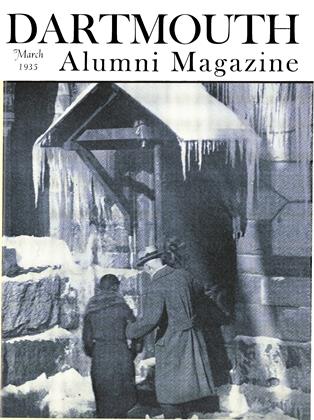Following the startling outcome of Dartmouth's Winter Carnival ski meet, Prof. C. A. Proctor 'oo was deluged with questions about the Intercollegiate Ski Union ruling which caused the Green relay team to be disqualified and consequently dropped Dartmouth from first to third in the final standings. At the request of the editors of the MAGAZINE, Professor Proctor has prepared the following explanation of the I. S. U. ruling:
The surprising result of the Carnival skimeet, when Dartmouth fell to third placebecause one of our men in the relay tookthe wrong course resulting in disqualification of the team, has caused so many questions that an explanation of how it cameabout should be of interest to the Alumni.In the method of scoring hitherto used,5, 3, 2 and i points for the first four places,Dartmouth had already won 42 points to13 for all the rest, so it seemed beyond belief that the meet could be lost by failurein the next-to-last and last events. It isdue to a glaring but unforseen fault in thescoring system used that a team which haddone so well could lose the meet becauseof a mistake on the part of one man, orbecause of an accident to one member ofthe relay team which might have producedthe same result.
The directors of the Intercollegiate SkiUnion decided last year that it would bevery desirable to make the result of eachevent depend upon team efficiency ratherthan upon the performance of one or twooutstanding individuals. It seemed naturaltherefore to adopt the system worked outabroad and approved by the InternationalSki Federation for scoring team events,and combining scores of individuals or ofteams in the different events.
Briefly this is as follows, though thenumber of men on a team in each eventmay differ in different meets. Four menmay represent a college in each event, thebest three to count in the scoring. Theindividual winning the event receives 100points and each other man receives pointsaccording to his relative performance. Forexample, if the slalom were won in 45 seconds, the winner would receive 100 pointsand a man finishing in 50 seconds wouldbe given forty-five fiftieths of 100 points,or 90 points. The team total for each eventis the sum of the points made by its bestthree men divided by three.
In the relay the winning team receives100 points and each other team score isworked out as above.
In any event other than the relay, ifone man "cracks up" the penalty to theteam score is small at the worst, but if onemember of a relay team cracks up, or ifthe team is disqualified, the penalty isvery severe. For example, in the recentmeet Dartmouth lost about 98 pointsthrough disqualification, since the team finished in second place, less than a minutebehind the winners. The spread of pointsis so small in this system that no possibledegree of achievement in the other eventscan offset such a loss. Obviously, the scoring system>, needs revision, which it is sureto get at the coming meeting of the I. S. V.
It should be said that this trouble hasnot cropped up abroad because six-eventmeets of this kind are not held, and thesystem is excellent for the purpose forwhich it is used over there.
We believe that the idea of team scoringis sound, and whatever scoring system isadopted will doubtless preserve this principle. For example, one suggestion is thatthe cross-country meet system be used, butthat the first twenty men, or perhaps thefirst thirty, shall count in the scoring. Togive proper weight to the relay then,points could be assigned to the teamsfrom the number competing down to one,and then multiplied by the integer whichxvould bring the winner's points nearestto twenty or thirty, as the case might be.
 View Full Issue
View Full Issue
More From This Issue
-
 Article
ArticleGraven Laycock: A Dartmouth Tradition
March 1935 By C. E. W. '30 -
 Article
ArticleHANOVER BROWSING
March 1935 By Herbert F. West '22 -
 Class Notes
Class NotesClass of 1914
March 1935 By C. Edward Leech -
 Class Notes
Class NotesClass of 1918
March 1935 By Allan C. Gottschaldt -
 Article
ArticleTwenty-Five Years Ago
March 1935 By Hap Hinman '10 -
 Class Notes
Class NotesClass of 1934
March 1935 By Martin J. Dwyer Jr.
Article
-
 Article
Article"Just #17028"
May 1941 -
 Article
ArticleClub Calendar
JANUARY/FEBRUARY 1985 -
 Article
ArticleReport: Boom Benefits African-American Men
NOVEMBER 1999 By Davida Dinerman '86 -
 Article
ArticleMedical School
OCTOBER 1970 By Harry W. Savage M’27 -
 Article
ArticleThe Story of an Indian
APRIL 1929 By Samson Occom -
 Article
ArticleWould 'Twere So!
January 1935 By The Editors

